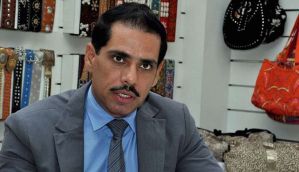Hurriyat, JKLF to hold talks with Kashmiri Pandits, clear their fears on return to the Valley
Kashmiri separatist groups will hold talks with Kashmiri Pandit migrants to discuss their return to the state, said Hurriyat Conference chairman Mirwaiz Umar Farooq on Friday.
"We have decided to form a joint committee from the resistance (separatist) camp - both groups of Hurriyat Conference and JKLF led by Mohammad Yasin Malik - which will interact with members of the Kashmiri Pandit community in the state and elsewhere as part of efforts to pave way for their return to Kashmir," he said.
The Hindu community was forced out of the Kashmir Valley 26 years ago after heightened militancy, says The Indian Express.
Riot-accused BJP MLA gives UP govt ultimatum: Bring back Kairana Hindus or face trouble
BJP legislator Sangeet Som, a prime accused in the 2013 Muzaffarnagar riots, gave the Uttar Pradesh government an ultimatum on Friday: bring back Hindu families who have allegedly migrated from Kairana within 15 days or face protests.
Though fact-finding teams have pointed out that the migration included both Hindus and Muslims mainly for economic reasons, the BJP seems unwilling to let go of the Hindu 'exodus' story first raised by local party MLA Hukum Singh, says the Hindustan Times.
The BJP on Friday released its own report on Kairana and demanded a CBI probe.
Cong receives legal notice over tweets calling Savarkar a 'traitor'
The grand-nephew of the late RSS ideologue VD Savarkar has sent a legal notice to the Congress for a series of tweets the party posted on its official handle in March that referred to Savarkar as a traitor.
The notice asked for an "unconditional apology" from the same Twitter handle "within 48 hours from the date of receipt of this notice", according to The Economic Times. The notice was sent on 16 June.
After Orlando, 26 foreign missions in Delhi unite to celebrate Pride Month
Twenty-six embassies and high commissions in New Delhi have joined together to celebrate alternative sexuality for two weeks as India still criminalises gay sex.
The initiative began on Friday with a discussion on gay rights at the American Centre in New Delhi. All the missions will fly the LGBTI rainbow flag along with their national flags, and light up their buildings at night in rainbow colours. There will be panel discussions, seminars and films on gay rights, says The Telegraph.
Jharkhand woman stripped, beaten, gangraped and paraded for being a witch
Four of six accused from a village in Jharkhand's West Singhbhum district have been arrested for stripping, beating up and gangraping a 45-year-old woman they called a witch.
The incident took place on 10 June. The victim filed a police complaint on 15 June.
According to the police, the woman was abducted by the six accused on the night of 10 June. They accused her of witchcraft, beat her up, stripped her and two of the accused raped her. The next morning, they paraded her in the village, says the Hindustan Times.
Gulbarg verdict weak, diluted; we will appeal: Teesta
Activist Teesta Setalvad called the special court's verdict in the Gulbarg Society massacre case on Friday a 'diluted and weak' judgment, and said that she would appeal against it.
Setalvad said: "We believe, when a person is convicted under Section 436 and 149, there should have been a life imprisonment under these also. And in that sense, it is very much diluted judgement and a weak judgement to which we will surely be appealing."
The Gulbarg Society massacre took place in 2002, when a mob of 400 people attacked the building and killed more than 60 people, says The Indian Express.
India's first female fighter pilots to be commissioned today
Three flying cadets, Bhawana Kath, Avani Chatuvedi and Mohana Singh, will be commissioned today as the first women fighter pilots in the Indian Air Force.
With their first stage of training cleared and about 150 hours each of flying experience, they will receive their wings today as flying officers, says NDTV. They will then train for six months on the Advanced Jet Fighter, after which they will be assigned fighters and their squadrons.
Air Chief Arup Raha said earlier that the three women will be assigned according to the needs of the force.
Ancient DNA tells of two origins for dogs
Genetic analyses of a 4,800-year-old Irish dog and 59 other ancient dogs suggest that canines and humans became pals in both Europe and East Asia long before the advent of farming, says a report in sciencenews.org.
Later, dogs from East Asia accompanied their human companions to Europe, where their genetic legacy trumped that of dogs already living there.
Therefore, dogs were domesticated at least twice. That muddled genetic legacy may help explain why previous studies have indicated that dogs were domesticated from wolves only once, although evidence hasn't been clear about whether this took place in East Asia, Central Asia or Europe.
The idea that dogs came from East Asia or Central Asia is mostly based on analysis of DNA from modern dogs, while claims for European origins have been staked on studies of prehistoric pups' genetics.
A 4,800-year-old dog found in a tomb in Newgrange, Ireland, is the first ancient dog to have its entire genetic instruction book, or genome, deciphered. Researchers don't know much about what the midsize dog looked like; it doesn't bear any genetic markers of particular modern dog breeds, Frantz says. "He wasn't black. He wasn't spotted. He wasn't white." Instead, the Newgrange dog was probably a mongrel with fur similar to a wolf's.
Westerners lack education on nuclear disaster risks
Western societies would not respond well to a Fukushima-style nuclear disaster due to a lack of public information, a leading disaster expert has warned. Christopher Abbott told the Guardian he firmly believed that the public ought to be better educated over the hazards and risks they may face. Illustrating his point, he referred to the Fukushima disaster of 2011 in which 160,000 people were evacuated from the vicinity of the plant as experts attempted to tackle the emergency. The evacuation worked, said Abbott, because "the Japanese educate the public". "I just don't see that it would have worked as successfully in western society," he added. "[It's] a very personal opinion but one that is backed up by Japanese colleagues." Abbott, chairman of the Emergency Planning Society CBRN professional working group, made the remarks while giving evidence to a science and technology select committee hearing at the House of Commons on chemical, biological, radiological or nuclear incidents. "We need to better educate the public, because a well-educated public will respond better," he said.







![BJP's Kapil Mishra recreates Shankar Mahadevan’s ‘Breathless’ song to highlight Delhi pollution [WATCH] BJP's Kapil Mishra recreates Shankar Mahadevan’s ‘Breathless’ song to highlight Delhi pollution [WATCH]](https://images.catchnews.com/upload/2022/11/03/kapil-mishra_240884_300x172.png)

![Anupam Kher shares pictures of his toned body on 67th birthday [MUST SEE] Anupam Kher shares pictures of his toned body on 67th birthday [MUST SEE]](https://images.catchnews.com/upload/2022/03/07/Anupam_kher_231145_300x172.jpg)






